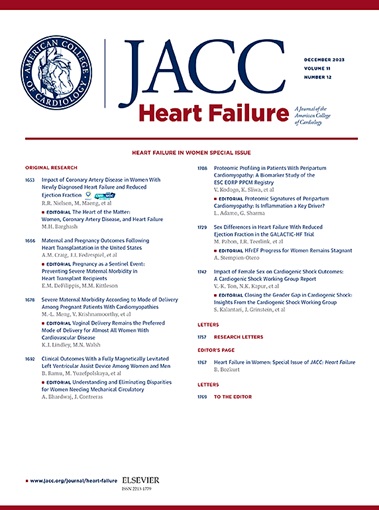用 Evolocumab 降低胆固醇治疗心脏移植受者心脏移植物血管病的随机试验。
IF 10.3
1区 医学
Q1 CARDIAC & CARDIOVASCULAR SYSTEMS
引用次数: 0
摘要
背景:心脏移植血管病变的特点是冠状动脉内膜厚度增加,尽管他汀类药物已被常规使用,但它仍是心脏移植(HTx)受者死亡的主要原因。在心脏移植受者中使用9型枯草蛋白酶抑制剂的经验有限。我们的假设是,在不影响安全性的前提下,使用9型丙蛋白转化酶枯草酶-kexin抑制剂evolocumab降低胆固醇可减少这些患者的冠状动脉内膜厚度:这项双盲、随机试验旨在检验 evolocumab 是否能减轻心脏同种异体移植血管病变的负担:方法:在北欧移植中心接受过心脏同种异体移植手术的患者在4至8周内随机接受每月皮下注射420毫克evolocumab或相应安慰剂。主要终点是治疗12个月后通过冠状动脉内超声测量的基线调整后最大内膜厚度:该试验在2019年6月至2022年5月期间招募了128名患者。56名患者接受了evolocumab治疗,54名患者接受了安慰剂治疗。12个月时,两组患者最大内膜厚度的调整后平均差异为0.017毫米(95% CI:-0.006至0.040;P = 0.14)。与安慰剂相比,使用 evolocumab 后低密度脂蛋白胆固醇的平均降幅为 1.11 mmol/L(95% CI:0.86-1.37 mmol/L)。使用 evolocumab 与不良事件增加无关:结论:使用 evolocumab 治疗 12 个月后,低密度脂蛋白胆固醇大幅降低,但并未减少 HTx 受试者的最大冠状动脉内膜厚度。(使用 EVOLocumab 降低胆固醇以预防心脏异体移植受者的心脏血管病变 [EVOLVD];NCT03734211)。本文章由计算机程序翻译,如有差异,请以英文原文为准。
Randomized Trial of Cholesterol Lowering With Evolocumab for Cardiac Allograft Vasculopathy in Heart Transplant Recipients
Background
Cardiac allograft vasculopathy is characterized by increased coronary intimal thickness and is a leading cause of death in heart transplant (HTx) recipients despite the routine use of statins. The experience with inhibitors of proprotein convertase subtilisin-kexin type 9 in HTx recipients is limited. Our hypothesis was that lowering cholesterol with the proprotein convertase subtilisin–kexin type 9inhibitor evolocumab would reduce coronary intimal thickness in these patients without compromising safety.
Objectives
This double blind, randomized trial was conducted to test whether evolocumab reduces the burden of cardiac allograft vasculopathy.
Methods
Patients who had received a cardiac allograft at 1 of the Nordic transplant centers within the prior 4 to 8 weeks were randomized to monthly subcutaneous injections of evolocumab 420 mg or matching placebo. The primary endpoint was the baseline-adjusted maximal intimal thickness as measured by intracoronary ultrasound after 12 months’ treatment.
Results
The trial enrolled 128 patients between June 2019 and May 2022. Matched pairs of coronary ultrasound images were available for 56 patients assigned to evolocumab and 54 patients assigned to placebo. At 12 months, the adjusted mean difference in the maximal intimal thickness between the 2 arms was 0.017 mm (95% CI: −0.006 to 0.040; P = 0.14). The mean reduction in low-density lipoprotein cholesterol with evolocumab compared with placebo was 1.11 mmol/L (95% CI: 0.86-1.37 mmol/L). The use of evolocumab was not associated with an increase in adverse events.
Conclusions
Twelve months of treatment with evolocumab substantially reduced low-density lipoprotein cholesterol but did not reduce maximal coronary intimal thickness in HTx recipients. (Cholesterol Lowering With EVOLocumab to Prevent Cardiac Allograft Vasculopathy in De-novo Heart Transplant Recipients [EVOLVD]; NCT03734211)
求助全文
通过发布文献求助,成功后即可免费获取论文全文。
去求助
来源期刊

JACC. Heart failure
CARDIAC & CARDIOVASCULAR SYSTEMS-
CiteScore
21.20
自引率
2.30%
发文量
164
期刊介绍:
JACC: Heart Failure publishes crucial findings on the pathophysiology, diagnosis, treatment, and care of heart failure patients. The goal is to enhance understanding through timely scientific communication on disease, clinical trials, outcomes, and therapeutic advances. The Journal fosters interdisciplinary connections with neuroscience, pulmonary medicine, nephrology, electrophysiology, and surgery related to heart failure. It also covers articles on pharmacogenetics, biomarkers, and metabolomics.
 求助内容:
求助内容: 应助结果提醒方式:
应助结果提醒方式:


